Central Scotland's Heaviest Fall of Snow for Years
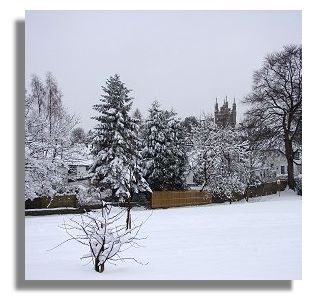 Although the forecasters were warning about the prospect of a heavy fall of snow for last Saturday night, an estimated 3,000 young people, who had been night-clubbing in the centre of Glasgow, were stranded when buses and taxis stopped running as a result of the snow. In the city, eight inches fell in a few hours and suburban areas had even deeper drifts, producing the deepest snow-fall for a number of years in the central lowlands. The youngsters were sheltered in a nightclub that remained open, a bus station and a city hotel. Many of the clubbers were dressed in T-shirts and other skimpy clothing. Strong winds added to the problems and the lack of traffic on Sunday meant that even main roads rapidly became snow-covered. The Erskine Bridge over the river Clyde was closed for five hours after vehicles became stranded and there was a spate of abandoned vehicles in many places. Both Glasgow and Edinburgh airports closed for a time and train services from Glasgow Central station were suspended. 2,000 homes in rural areas of Dumfries and Galloway in the south-west of Scotland lost their electricity supply as power lines came down as a result of accumulation of wet snow. Side roads were still proving to be difficult on Monday but main roads were largely clear by then.
Although the forecasters were warning about the prospect of a heavy fall of snow for last Saturday night, an estimated 3,000 young people, who had been night-clubbing in the centre of Glasgow, were stranded when buses and taxis stopped running as a result of the snow. In the city, eight inches fell in a few hours and suburban areas had even deeper drifts, producing the deepest snow-fall for a number of years in the central lowlands. The youngsters were sheltered in a nightclub that remained open, a bus station and a city hotel. Many of the clubbers were dressed in T-shirts and other skimpy clothing. Strong winds added to the problems and the lack of traffic on Sunday meant that even main roads rapidly became snow-covered. The Erskine Bridge over the river Clyde was closed for five hours after vehicles became stranded and there was a spate of abandoned vehicles in many places. Both Glasgow and Edinburgh airports closed for a time and train services from Glasgow Central station were suspended. 2,000 homes in rural areas of Dumfries and Galloway in the south-west of Scotland lost their electricity supply as power lines came down as a result of accumulation of wet snow. Side roads were still proving to be difficult on Monday but main roads were largely clear by then.
New "World Class" Hospital
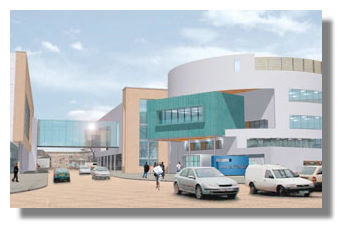 The campaign to keep the maternity and children's hospitals at Yorkhill in Glasgow ended in failure this week when an independent report proposed integrating the Royal Hospital For Sick Children and the Queen Mother's Maternity Hospital into a new single unit at the Southern General, on the other side of the river Clyde. However, Scottish Health Minister Andy Kerr promised that the new hospital would be "world-class" and would provide big advantages for sick babies and their mothers. The report warned, however, that the Yorkhill hospitals may have to close up to four years before the new facility can be open in 2010-11. Bearing in mind the government's track record on large building projects such as other hospitals (far less their own parliament building), even that timescale may be optimistic. The new facility at the Southern General will have maternity and paediatric wings next to each other, with support services for both on the door-step. In theory, the result should eventually be a better service than currently offered at Yorkhill.
The campaign to keep the maternity and children's hospitals at Yorkhill in Glasgow ended in failure this week when an independent report proposed integrating the Royal Hospital For Sick Children and the Queen Mother's Maternity Hospital into a new single unit at the Southern General, on the other side of the river Clyde. However, Scottish Health Minister Andy Kerr promised that the new hospital would be "world-class" and would provide big advantages for sick babies and their mothers. The report warned, however, that the Yorkhill hospitals may have to close up to four years before the new facility can be open in 2010-11. Bearing in mind the government's track record on large building projects such as other hospitals (far less their own parliament building), even that timescale may be optimistic. The new facility at the Southern General will have maternity and paediatric wings next to each other, with support services for both on the door-step. In theory, the result should eventually be a better service than currently offered at Yorkhill.
Only Room for 90 Members of the Scottish Parliament
With the debating chamber at their new building still closed because of the dramatic collapse of one of its roof beams, and with their temporary facility at the Festival "Hub" pre-booked for next week by another organisation, the Members of the Scottish Parliament (MSPS) are now going to meet in a committee room within the parliament building itself which can only accommodate 90 out of the 129 members. While full attendance by all MSPs at the one time is a rare occurrence, if more than 90 turn up for a debate, they will have to be located in a separate room. The advantage, of course, is that the committee room is "in-house" and the MSPs will not have to travel by bus (or walk) the mile to the Hub. But there will be problems relating to the electronic voting system, which is normally located at each of their desks in the chamber. There will be no space for the press or public - but they can watch proceedings on closed-circuit TV screens elsewhere in the building. Investigations into why the beam collapsed in the first place has shown that one retaining bolt was missing and another had been rammed into the beam incorrectly and had then been broken. That one eventually snapped altogether, allowing the beam to swing down - held in place by the bolts at the other end. This shoddy workmanship is costing the taxpayer a lot of money - and adds to the embarrassment which has been an unfortunate feature of this new legislature.
What's in a Name?
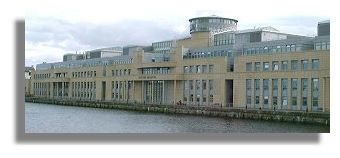 A Scottish National Party Member of the Scottish Parliament has called on ministers to drop the term "Scottish Executive" and use "Scottish Government" instead. Christine Grahame claims that the term "Executive" is confusing - but an earlier attempt to make the change nearly caused a civil war within the Scottish Labour Party. One UK Parliament Labour member famously declared, at the time of that debate, that Scottish ministers could call themselves the "White Heather Club" for all he cared. Since then, ministers have frequently used the term Scottish government - though officially it is the Scottish Executive - to avoid confusion with the "real" government in London. The illustration shows the Scottish Executive offices in Leith.
A Scottish National Party Member of the Scottish Parliament has called on ministers to drop the term "Scottish Executive" and use "Scottish Government" instead. Christine Grahame claims that the term "Executive" is confusing - but an earlier attempt to make the change nearly caused a civil war within the Scottish Labour Party. One UK Parliament Labour member famously declared, at the time of that debate, that Scottish ministers could call themselves the "White Heather Club" for all he cared. Since then, ministers have frequently used the term Scottish government - though officially it is the Scottish Executive - to avoid confusion with the "real" government in London. The illustration shows the Scottish Executive offices in Leith.
Country at a Standstill on 28 March?
Scottish local government staff, including schools and social services, are scheduled to join in a strike by 1.5 million workers in the UK on 28 March, protesting about changes to their pension scheme. It will be the most widespread industrial action since the General Strike in 1926 and will bring much of the country to a halt. Bus services in Edinburgh will be restricted, there will be no refuse collection that day, council-run nurseries will close - and there will be nobody to collect the tolls on the Forth Bridge. Trade unions have warned that the action on 25 March is "just the start" and that there would be further industrial action unless the provision for retirement at 60 is reinstated. The government claim that the existing pension arrangements now break "European rules" on age discrimination. As a result, the retiral age for all local government employees would be 65 instead of 60.
Scottish Retail Growth Slightly Ahead
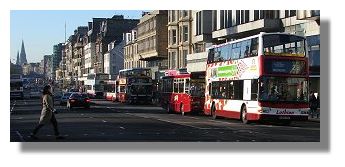 Even though Scotland's retail sales in February were marginally ahead of the UK as a whole, sales remained disappointing. Scottish Retail Consortium figures show growth of only 0.8% on like-for-like sales and an overall growth (including new outlets) of 4.1% over February last year. The UK-wide data showed a like-for-like sales increase of 0.6%, with a total growth of 3.5%. January data had also been uninspiring, despite heavy discounting by many shops, with a decline of 0.6% on a like-for-like basis - the first negative figures for over five years. The snow this week and low temperatures for many weeks is likely to produce more gloom on the high streets - at a time when new spring stock should be having an impact. The illustration is of Edinburgh's main shopping area on Princes Street.
Even though Scotland's retail sales in February were marginally ahead of the UK as a whole, sales remained disappointing. Scottish Retail Consortium figures show growth of only 0.8% on like-for-like sales and an overall growth (including new outlets) of 4.1% over February last year. The UK-wide data showed a like-for-like sales increase of 0.6%, with a total growth of 3.5%. January data had also been uninspiring, despite heavy discounting by many shops, with a decline of 0.6% on a like-for-like basis - the first negative figures for over five years. The snow this week and low temperatures for many weeks is likely to produce more gloom on the high streets - at a time when new spring stock should be having an impact. The illustration is of Edinburgh's main shopping area on Princes Street.
How Will We Cope With Growing Old?
A public consultation was launched this week which will examine how Scotland should plan for the "demographic timebomb" of an aging population. In 2001, 16% of the country's population was over 65; by 2031 that figure will have risen to 27%, while the percentage over 80 will rise from 3.8% to 8.2% over the same timescale. It is hoped that the study will challenge the perception that older people are a "burden on society" with exhausted pension funds and overflowing hospitals. With many of the older population these days still economically active - and paying for goods and services from pensions and savings, they are an important element in the economy of the country. The public consultation is divided into five different themes: contribution and opportunity; services; health and wellbeing; accommodation and environment; and work. For information on the consultation, see www.infoscotland.com/experience.
Bank's Financial Support for Scottish Team
 News items relating to the Scotland team participating in the Commonwealth Games in Melbourne can be found in the Sports section below. Of more general interest, perhaps, is the commemorative £10 banknote issued by Clydesdale Bank this week. The design incorporates the Scotland Commonwealth Games team logo on the front and a montage of images on the back of the note. Various sports are represented, including cycling, gymnastics, javelin, weight-lifting, hockey and bowls. The notes were being issued via through-the-wall auto-tellers across the country on Wednesday. The lobby machine in the Clydesdale Bank's head office in Glasgow ran out of the notes and customers were being redirected to the nearest available machine - at Costa Coffee, round the corner.
News items relating to the Scotland team participating in the Commonwealth Games in Melbourne can be found in the Sports section below. Of more general interest, perhaps, is the commemorative £10 banknote issued by Clydesdale Bank this week. The design incorporates the Scotland Commonwealth Games team logo on the front and a montage of images on the back of the note. Various sports are represented, including cycling, gymnastics, javelin, weight-lifting, hockey and bowls. The notes were being issued via through-the-wall auto-tellers across the country on Wednesday. The lobby machine in the Clydesdale Bank's head office in Glasgow ran out of the notes and customers were being redirected to the nearest available machine - at Costa Coffee, round the corner.
Luring Londoners to Shetland
A summer break for Londoners in a latitude that's the same as Anchorage, Alaska or the southern tip of Greenland? The answer may be 'yes' if the location can boast 100 islands (only 15 are inhabited) and there are 138 sandy beaches (wonder who counted them all?), 19 hours of daylight from June to August and some of the most spectacular scenery and wildlife in Europe. So a promotional campaign was launched this week in London's Underground to encourage an increase in the number of visitors to Shetland. Faroese airline Atlantic Airways is offering a direct link from the UK capital to Shetland, for as little as £155 return. Bearing in mind the high cost of internal air travel within Scotland, maybe they'll make a stop-over sometime in Edinburgh or Glasgow and provide access to Shetland from the most densely populated part of Scotland? Shetland's visitor numbers are still modest, but they have gone up by 22% over the last three years, despite rain or showers on 269 days a year and a maximum average daytime temperature in August of just 57.2F (14C).
Scotland's New Tourist Hotspot - Leith
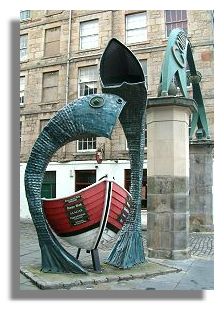 Although these days Leith is contiguous with Edinburgh, the port is overshadowed by its larger neighbour, particularly when it comes to attracting tourists. Despite being home to the Royal Yacht Britannia and the Ocean Terminal plus a number of well-known gourmet restaurants, Leith has never been marketed as a tourist destination in its own right. But a new campaign - masterminded by Leith Initiatives For Tourism (Lift) - is being drawn up to highlight the area's visitor attractions and historical buildings as well as its shops, cafes, bars and restaurants. Leith also boasts Scotland's best curry houses - La Favorita was named the UK's best pizza restaurant last year. There is to be a new glossy brochure showcasing the area plus advertising in newspapers and magazines and posters. These will be part of the "short breaks to Leith" campaign, which will be targeted at national, UK and international audiences.
Although these days Leith is contiguous with Edinburgh, the port is overshadowed by its larger neighbour, particularly when it comes to attracting tourists. Despite being home to the Royal Yacht Britannia and the Ocean Terminal plus a number of well-known gourmet restaurants, Leith has never been marketed as a tourist destination in its own right. But a new campaign - masterminded by Leith Initiatives For Tourism (Lift) - is being drawn up to highlight the area's visitor attractions and historical buildings as well as its shops, cafes, bars and restaurants. Leith also boasts Scotland's best curry houses - La Favorita was named the UK's best pizza restaurant last year. There is to be a new glossy brochure showcasing the area plus advertising in newspapers and magazines and posters. These will be part of the "short breaks to Leith" campaign, which will be targeted at national, UK and international audiences.
The illustration is the entrance to Commercial Quay, Leith.
25% Increase in Bus Fares
The cheapest fare on Lothian Buses which serve Edinburgh and surrounding areas is to rise from 80p to £1 - a 25% increase. The new fare will make a short bus journey in the Capital the most expensive in the country. However, the fare for longer journeys is to come down from £1.10 to the flat rate of £1 and the cost of an all-day ticket is unchanged. The bus company, which is owned by Edinburgh City Council, is blaming the 75% increase in fuel prices and an above-inflation pay rise for staff after a series of crippling strikes last year. The deal means a further pay rise next year, producing a 12% increase on pay levels over those in 2005.
60% Increase in Parking Charges
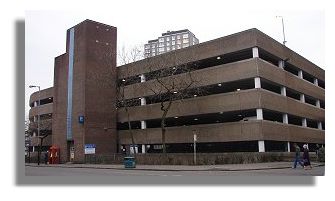 The car parks owned by Glasgow City Council are increasing their charges next month by 60%. Motorists using the car parks in the city centre at St Enoch, Charing Cross, Cadogan Square, Cambridge Street (pictured here), Concert Square and the Sauchiehall Centre will all rise. Cadogan Square, for example, will see an increase from 50p to 80p an hour for the first three hours, an increase of 60%. The council claims that the charges are still much lower than in privately operated car parks. Even so, it will inevitably encourage shoppers to use the free parking at out-of-town malls such as Braehead and Glasgow Fort and the new shopping centre at Pollok, which is nearing completion. On recent wander around the centre of Glasgow, I was conscious of how little traffic there was on the roads - and the new charges have yet to bite. Of course, those who commute to work by car in the city will just have to pay up.
The car parks owned by Glasgow City Council are increasing their charges next month by 60%. Motorists using the car parks in the city centre at St Enoch, Charing Cross, Cadogan Square, Cambridge Street (pictured here), Concert Square and the Sauchiehall Centre will all rise. Cadogan Square, for example, will see an increase from 50p to 80p an hour for the first three hours, an increase of 60%. The council claims that the charges are still much lower than in privately operated car parks. Even so, it will inevitably encourage shoppers to use the free parking at out-of-town malls such as Braehead and Glasgow Fort and the new shopping centre at Pollok, which is nearing completion. On recent wander around the centre of Glasgow, I was conscious of how little traffic there was on the roads - and the new charges have yet to bite. Of course, those who commute to work by car in the city will just have to pay up.
Over 50% of Edinburgh Residents Originate from Elsewhere
A survey of over 1,000 Edinburgh residents, commissioned by the City Council, has shown that over 50% of those living in the capital were born outside of the Capital. 25% come from other parts of Scotland and just under 20% were born in other regions of the UK. Just under 10% originated in countries beyond the British Isles. An Edinburgh Council spokesman said: "Edinburgh's population reflects its position as a dynamic capital city, with a mix of indigenous residents and newcomers."
Good and Bad News for Supermarket Staff
 430 staff in the Dundee distribution depot operated by Tesco, the UK's largest supermarket chain, were shocked this week when they were told that they were to lose their jobs in 2007. The company is relocating to a massive new facility in Livingston, 60 miles to the south of the Tayside city. None of the staff had been aware of the company's plans until the announcement this week. Tesco say that the Dundee site had no room for expansion and no suitable alternative could be found in the area. The announcement came as part of an announcement of a £75 million capital investment by the company in Scotland - including a massive new depot at Livingston, which will create employment opportunities there. Tesco has five supermarkets in Dundee and the customer service call centre in the city will be unaffected.
430 staff in the Dundee distribution depot operated by Tesco, the UK's largest supermarket chain, were shocked this week when they were told that they were to lose their jobs in 2007. The company is relocating to a massive new facility in Livingston, 60 miles to the south of the Tayside city. None of the staff had been aware of the company's plans until the announcement this week. Tesco say that the Dundee site had no room for expansion and no suitable alternative could be found in the area. The announcement came as part of an announcement of a £75 million capital investment by the company in Scotland - including a massive new depot at Livingston, which will create employment opportunities there. Tesco has five supermarkets in Dundee and the customer service call centre in the city will be unaffected.
Read About Modern Scotland
The Scottish Executive has launched a new quarterly e-magazine - "Scotland Now" - created for Scotland's friends, alumni and diaspora all around the world. The first issue explores some myths about Scotland, investigates the Scottish influence on music and considers how our rich literary heritage is drawing in tourists from across the globe. It also provides a comprehensive guide to researching your Scottish ancestry, looks at the Highlands and Islands - and sees how a Scottish education benefited some early Australians. In each issue they will also highlight some of the events that Scots are hosting across the globe. There will soon also be three podcasts on 'Scotland's Literature', including recordings by Ian Rankin, Alexander McCall Smith, Louise Welch and James Robertson. For all the articles - and to sign up for future issues of the free e-magazine, see Scotland Is The Place.
League Table of Airport Delays
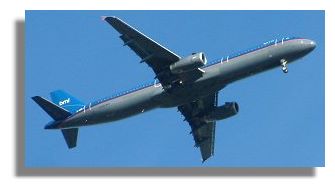 A league table of airline punctuality (or lack of) at Edinburgh and Glasgow airports was published this week. It shows that Bmi (that's one of their Airbus aircraft in the illustrtation) was the most punctual British airline for flights leaving Scotland but British Airways, which charges far more than budget carriers, had longer delays than their low-cost rivals, such as easyJet. Bmi flights between Edinburgh and Heathrow were delayed by an average of 11.5 minutes, with 17.5 minutes for BA, and nearly 15 minutes for EasyJet, which flies to Stansted, Luton and Gatwick. At Glasgow, however, EasyJet was best with its Stansted and Luton flights running an average of just eight minutes late against nine minutes for Bmi and 15 minutes for BA to Heathrow. BA can't even claim (as they used to) that the problems are due to congestion at Heathrow - Bmi fly there too. Of the 20 largest scheduled airlines at Edinburgh, Aer Lingus was the least punctual. Its 60 minute flights to Dublin were on average 23 minutes late and nearly 10% were more than one hour behind schedule. The figures were compiled by website www.flightontime.info using statistics from the Civil Aviation Authority. Their tables go back to 2001.
A league table of airline punctuality (or lack of) at Edinburgh and Glasgow airports was published this week. It shows that Bmi (that's one of their Airbus aircraft in the illustrtation) was the most punctual British airline for flights leaving Scotland but British Airways, which charges far more than budget carriers, had longer delays than their low-cost rivals, such as easyJet. Bmi flights between Edinburgh and Heathrow were delayed by an average of 11.5 minutes, with 17.5 minutes for BA, and nearly 15 minutes for EasyJet, which flies to Stansted, Luton and Gatwick. At Glasgow, however, EasyJet was best with its Stansted and Luton flights running an average of just eight minutes late against nine minutes for Bmi and 15 minutes for BA to Heathrow. BA can't even claim (as they used to) that the problems are due to congestion at Heathrow - Bmi fly there too. Of the 20 largest scheduled airlines at Edinburgh, Aer Lingus was the least punctual. Its 60 minute flights to Dublin were on average 23 minutes late and nearly 10% were more than one hour behind schedule. The figures were compiled by website www.flightontime.info using statistics from the Civil Aviation Authority. Their tables go back to 2001.
"Sister State" Agreement Between Scotland and Victoria
Scotland's First Minister Jack McConnell, who is visiting Melbourne for the Commonwealth Games, and Victorian State Premier Steve Bracks, signed a "Sister State" agreement this week. This will promote collaboration in the areas of health, education, trade, tourism and social policy. The First Minister commented: "Scots have been making the journey to Australia for over 200 years. Today, at least one in eight Australians can claim Scottish descent, and the influence of successive generations of Scots can be seen everywhere - in Australia's place names and in its national anthem. In 2006 these links are as strong as ever - and the sense of co-operation and goodwill between Scotland and Victoria develops at every level. Our devolved government in Scotland shares very similar responsibilities, such as education, health and criminal justice, as the State government in Victoria. That is why I am pleased to sign this sister state agreement with Premier Bracks."
Tartan Day 2006
 Back in 1998, the US Senate designated 6 April each year as Tartan Day "in recognition of the monumental achievements and invaluable contributions made by Scottish Americans." Previously, special events had been held in some parts of the US (and Canada) to celebrate this day. But the Senate resolution provided a further impetus and a growing number of organisations and individuals are having their own local festivities - even in Scotland! So that these events can gain further publicity within the world-wide Scottish community, and to allow as many people as possible to participate, the details of a number of these celebrations are listed in a Web page on Rampant Scotland. The list has recently been updated - but a number need to be made current. So if you have any information about Tartan Day events in your part of the world in April - or any other time of the year - please let me know at Scottie@RampantScotland.com . If you have already e-mailed me, the entry should already be up to date now. See Tartan Day Events.
Back in 1998, the US Senate designated 6 April each year as Tartan Day "in recognition of the monumental achievements and invaluable contributions made by Scottish Americans." Previously, special events had been held in some parts of the US (and Canada) to celebrate this day. But the Senate resolution provided a further impetus and a growing number of organisations and individuals are having their own local festivities - even in Scotland! So that these events can gain further publicity within the world-wide Scottish community, and to allow as many people as possible to participate, the details of a number of these celebrations are listed in a Web page on Rampant Scotland. The list has recently been updated - but a number need to be made current. So if you have any information about Tartan Day events in your part of the world in April - or any other time of the year - please let me know at Scottie@RampantScotland.com . If you have already e-mailed me, the entry should already be up to date now. See Tartan Day Events.
Visitors Like Us
Costly surveys which prove something that everyone already knows are always a bit of a puzzle, but then it's always nice to have our opinions confirmed. The latest survey, commissioned by the tourism agency VisitScotland, has shown that 97% of tourists (including those from England) had their expectations of Scotland prior to their holiday, either exceeded or met. The survey also revealed that 96% of visitors were likely to recommend Scotland as a holiday destination on returning home. This was one of the most extensive surveys ever carried out of visitors and it showed that the friendly welcome of Scottish people and the scenery were listed as the highlights of a holiday in Scotland. Well, of course!
Battle Over Tay Bridge Tolls
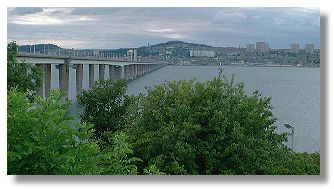 There was an outcry in Fife and Angus a few weeks ago when the Scottish Executive announced that tolls were to be scrapped in the west on the Erskine Bridge over the Clyde - but were to stay on the Forth and Tay bridges in the east of the country. While few would argue for removing tolls on the already overloaded Forth Bridge, local councils in Dundee and Fife argue that the Tay bridge charges should also go. It is argued, however, that lifting the Tay tolls could aggravate congestion and air pollution in Dundee. The Tay Road Bridge Joint Board (made up of representatives from the local councils) has voted unanimously in favour of ending the 80p levy. Members believe that the information on congestion is invalid. However, the Transport Minister says that the key question is the outstanding debt on the bridge of some £13million. The Erskine Bridge had been paid for (and then some), partly due to more traffic and partly due to charges there being 50% higher than on the Tay Bridge. Of course, why some bridges should have a toll and main roads and all other bridges are covered by the normal annual Road Tax paid by all vehicles, has always been a mystery.
There was an outcry in Fife and Angus a few weeks ago when the Scottish Executive announced that tolls were to be scrapped in the west on the Erskine Bridge over the Clyde - but were to stay on the Forth and Tay bridges in the east of the country. While few would argue for removing tolls on the already overloaded Forth Bridge, local councils in Dundee and Fife argue that the Tay bridge charges should also go. It is argued, however, that lifting the Tay tolls could aggravate congestion and air pollution in Dundee. The Tay Road Bridge Joint Board (made up of representatives from the local councils) has voted unanimously in favour of ending the 80p levy. Members believe that the information on congestion is invalid. However, the Transport Minister says that the key question is the outstanding debt on the bridge of some £13million. The Erskine Bridge had been paid for (and then some), partly due to more traffic and partly due to charges there being 50% higher than on the Tay Bridge. Of course, why some bridges should have a toll and main roads and all other bridges are covered by the normal annual Road Tax paid by all vehicles, has always been a mystery.
Swallow Gulps Down Six Scottish Hotels
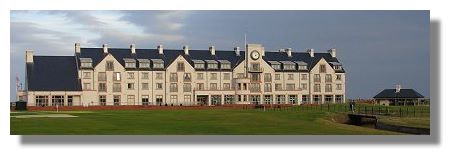
The Swallow Hotel Group has bought another six Scottish hotels for over £20 million, and has another three purchases nearing completion. That will bring their portfolio to 70 hotels north of the border, more than any other operator - and the aim is to have over 100 by the end of the year. This week's acquisitions included the family-owned Freedom of the Glen hotel chain, comprising the Ballachulish Hotel near Glencoe, The Isles of Glencoe Hotel and Leisure Centre, and the Oban Caledonian Hotel. The other purchases are the Carnoustie Golf Hotel & Resort; the Gleddoch House Hotel and Country Estate at Langbank in Renfrewshire, which has an 18-hole golf course; and the Huntly Arms in Aboyne. The takeover of the Carnoustie Golf Hotel is particularly significant - it adjoins the championship golf course which is hosting next year's Open. Its holding company is debt-laden and the hotel is understood to have never made a profit since opening in 1999. Swallow Hotels management say that they aim to make the resort a year-round attraction, rather than relying on the summer period only.
Lithuanian Bank Refuses Scottish Banknotes
Vladimir Romanov, the Lithuanian banker who has ploughed millions into his ownership of Heart of Midlothian Football Club, clearly doesn't take any Scottish banknotes back to his home country. Davie Rutherford (a Hibernian supporter, by the way) tried to cash £150 of Scottish banknotes at Lithuanian bank Ukio Bankas, controlled by the multi-millionaire. Staff refused to accept his Scottish currency - and none of the other banks in Lithuania would exchange the currency either. Later, a bank spokesman said that it was unusual to get such requests for such a transaction, but they would look at the facility for the future. Of course, one problem is that while Bank of England notes, Euros or US dollars can subsequently be sold to other customers who are travelling to these areas, there is unlikely to be a similar demand from Lithuanians for Scottish banknotes. So the notes would have to be transported back to Scotland, with associated expense. And Davie Rutherford (and most Scots) are unaware that Scottish banknotes are technically not "legal tender" - even in Scotland. Indeed, as Bank of England notes are not "legal tender" (whatever that term means) in Scotland, the country doesn't have any banknotes which meet the legal definition. Confused? See Did You Know - Scottish Banknotes.
Weather in Scotland This Week
 As noted earlier in this Newsletter, there was a heavy fall of snow last Saturday night across most of central Scotland. A moist Atlantic front met a cold front driven by a strong north-easterly wind, producing the deepest snow for some years in the central Lowlands, particularly in the west. Airports were closed, train services were crippled and roads became treacherous. An incoming flight from the US to Edinburgh had to be diverted to Belfast in Northern Ireland. The A9 road between Perth and Inverness was closed for a spell, as was the M74 motorway from Glasgow to England. Many rural communities were stranded despite gritters being out on main roads working throughout Saturday night. There was a gradual thaw, but it was several days before all the snow had been cleared from side roads. There was further snow on Thursday, mostly in the east and the Scottish Borders. This caused a flurry of accidents early in the morning in Edinburgh but the impact did not last for long. Until, Friday, temperatures were recorded in the mainly in the range 3/5C (37/41F) but the strong north-easterly winds created a significant wind chill factor. From Sunday to Wednesday there was hardly a blink of sunshine over much of the country. Friday was the exception, with a slight rise in temperatures that day too. But the below-average temperatures are forecast to return for most of next week.
As noted earlier in this Newsletter, there was a heavy fall of snow last Saturday night across most of central Scotland. A moist Atlantic front met a cold front driven by a strong north-easterly wind, producing the deepest snow for some years in the central Lowlands, particularly in the west. Airports were closed, train services were crippled and roads became treacherous. An incoming flight from the US to Edinburgh had to be diverted to Belfast in Northern Ireland. The A9 road between Perth and Inverness was closed for a spell, as was the M74 motorway from Glasgow to England. Many rural communities were stranded despite gritters being out on main roads working throughout Saturday night. There was a gradual thaw, but it was several days before all the snow had been cleared from side roads. There was further snow on Thursday, mostly in the east and the Scottish Borders. This caused a flurry of accidents early in the morning in Edinburgh but the impact did not last for long. Until, Friday, temperatures were recorded in the mainly in the range 3/5C (37/41F) but the strong north-easterly winds created a significant wind chill factor. From Sunday to Wednesday there was hardly a blink of sunshine over much of the country. Friday was the exception, with a slight rise in temperatures that day too. But the below-average temperatures are forecast to return for most of next week.
The illustration shows a crocus re-emerging from the snow.
This Week's Colour Supplement
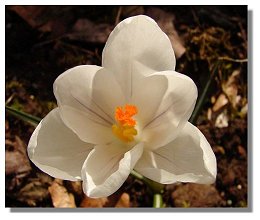 This week's larger photographs taken in Scotland to show the current season and its flora and fauna include snow scenes at Kilmardinny Loch, a female chaffinch, snow-covered Campsie Hills, grey squirrel and white crocus. See This Week's Colour Supplement.
This week's larger photographs taken in Scotland to show the current season and its flora and fauna include snow scenes at Kilmardinny Loch, a female chaffinch, snow-covered Campsie Hills, grey squirrel and white crocus. See This Week's Colour Supplement.
|


The Scottish Snippets Newsletter in its original format began in April 1997 and continued in an unbroken series for 591 issues. Although no longer produced in that format there is now a regular update on the new and updated pages on the Rampant Scotland site and also "Scottie's Diary" on an intermittent basis, To receive this, kust send an e-mail to Scottie with "Subscribe Newsletter" in the subject line.
 Historical Affairs - Topical Items from Scotland's Past
Historical Affairs - Topical Items from Scotland's Past


